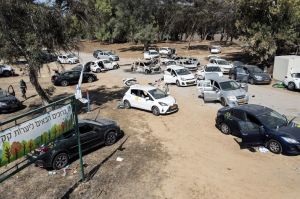Attack Forces Indonesian Christians Off Campus
JAKARTA, Indonesia (AP) — Hundreds of Christian theology students have been living in tents since a mob of angry Muslim neighbors stormed their campus last month wielding bamboo spears and hurling Molotov cocktails.
The incident comes amid growing concern that Indonesia's tradition of religious tolerance is under threat from Islamic hard-liners.
In talks since the attack, the Arastamar Evangelical School of Theology has reluctantly agreed to shut its 20-year-old campus in east Jakarta, accepting an offer this week to move to a small office building on the other side of the Indonesian capital.
"Why should we be forced from our house while our attackers can walk freely?" asked the Rev. Matheus Mangentang, chairman of the 1,400-student school.
The government of President Susilo Bambang Yudhoyono, which relies on the support of Islamic parties in Parliament, is struggling to balance deep Islamic traditions and a secular constitution. With elections coming next April, the government seems unwilling to defend religious minorities, lest it be portrayed as anti-Islamic in what is the world's most populous Muslim-majority country.
The July 25 attack, which injured 18 students, was the culmination of years of simmering tensions between the school and residents of the Kampung Pulo neighborhood.
Senny Manave, a spokesman for the Christian school, said complaints were received from neighbors about prayers and the singing of hymns, which they considered disturbing evangelical activity.
Several neighbors refused to comment, saying they feared that could further strain relations. A prominent banner, signed by scores of people, has been hung over an entrance to the neighborhood.
"We the community of Kampung Pulo demand the campus be closed and dissolved," it says.
The assault began around midnight, when students woke to the crash of stones falling on their dormitory roof as a voice over a loudspeaker at a nearby mosque cried "Allah Akbar," or "God is great" in Arabic.
The unidentified speaker urged residents to rise up against their "unwanted neighbors," said Sairin, the head of campus security, who goes by a single name.
The attack followed a claim that a student had broken into a resident's house, but police dismissed the charge.
Uneasy relations date to 2003, when neighbors began to protest the school's presence. Last year, residents set fire to shelters for construction workers to try to stop the campus from expanding deeper into the neighborhood. Some also questioned the legality of the school's permit.
Christian lawmaker Karol Daniel Kadang accused property speculators of provoking last month's incident to clear the land for more profitable use, after the school refused to sell out.
He also blamed the government for failing to build interfaith relations, which he and others believe are beginning to fray.
"People are still tolerant, but there is a growing suspicion among Muslims of others," said Prof. Franz Magnis-Suseno, a Jesuit priest who has lived in Indonesia for half a century.
He added that the police have failed to prevent both attacks on minorities and the forced closure of Christian churches and nontraditional mosques by mobs incited by radical Muslims.
"The state has some responsibility for this growing intolerance, namely by not upholding the law," he said.
A mob stormed a church service last Sunday in another east Jakarta neighborhood, forcing dozens of Christian worshippers to flee, said Jakarta Police Chief Col. Carlo Tewu. No arrests have been made.
Since being driven from campus, nearly 600 female students have been sleeping under suspended tarps at a nearby scout camp, where they had to dig trenches to keep water out during downpours. Classes are held with megaphones in the sweltering summer heat, under trees or the tarps. A similar number of male students live in a guesthouse. The remainder have returned to their families.
Food, water and school supplies are donated by church groups and community charities.
"We feel like refugees in our own country," said Dessy Nope, 19, a second-year student majoring in education. "How can you study here? I only followed 20 percent of my last lesson. It's difficult to concentrate."
Christians have not been the only targets for Muslim hard-liners, who this year set fire to mosques of a Muslim sect, Ahmadiyah, that they consider heretical.
In June, the government ordered members of the sect to return to mainstream Islam, sparking concern among activists who fear the state is interfering in matters of faith and caving in to the demands of radicals.
"We're living in a country where there are many religions, but the government cannot prevent the actions of fundamentalist groups," said Manave, the school spokesman. "The government cannot protect minorities."





























